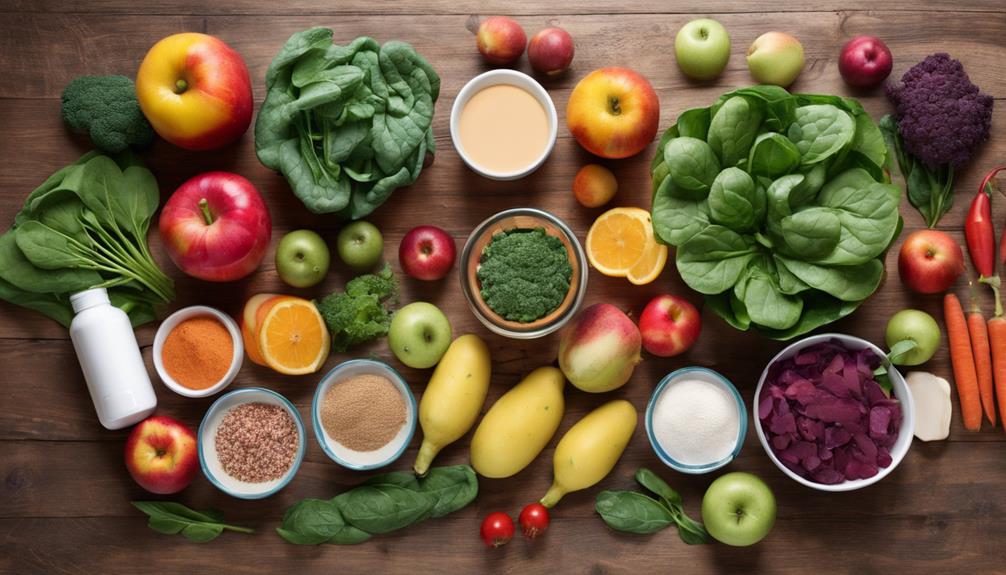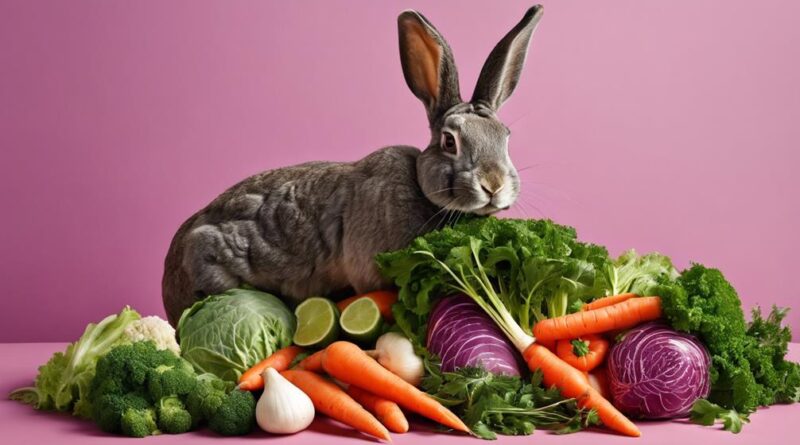Top Nutritious Foods for Your Pet Rabbit Guide
When it comes to caring for your pet rabbit's health, providing the right nourishment is key to their well-being. Imagine their diet as the building blocks of a strong foundation.
But, have you considered the top nutritious foods that should be a staple in their daily meals? From fresh vegetables to carefully selected treats, each choice plays a vital role in keeping your furry friend happy and healthy.
But how do you know which foods are truly beneficial for your pet rabbit? Let's explore the essential components of a well-rounded diet that will support their overall health and vitality.
Fresh Vegetables
When feeding your pet rabbit fresh vegetables, be sure to provide a variety for a well-rounded diet. Leafy greens are essential for your rabbit's health. Vegetables like kale, romaine lettuce, and parsley are excellent choices. These leafy greens are packed with essential nutrients and fiber that aid in digestion.
In addition to leafy greens, root vegetables can also be a great addition to your rabbit's diet. Carrots, beets, and radishes are examples of root vegetables that rabbits enjoy. These vegetables offer a different texture and flavor profile, adding variety to your pet's meals. However, root vegetables should be given in moderation due to their higher sugar content.
When it comes to fruits, opt for high fiber, low sugar options to treat your rabbit. Fruits like strawberries, blueberries, and apples can be a tasty snack for your furry friend. These fruits provide vitamins and minerals while keeping the sugar intake in check. Remember, fruits should only be given as occasional treats due to their sugar content.
Pellets
To ensure a well-balanced diet for your pet rabbit, incorporating high-quality pellets is essential. When selecting pellets for your rabbit, consider the following:
- Pellet options: Choose pellets that are specifically formulated for rabbits. Look for pellets that contain high levels of fiber (18-25%), as well as essential nutrients like vitamin A, vitamin D, and calcium. Avoid pellets with nuts, seeds, dried fruit, or colored pieces, as these can be high in fat and sugar.
- Nutrition: Pellets should make up a portion of your rabbit's diet, but they shouldn't be the sole source of nutrition. Ensure your rabbit also has access to fresh hay, water, and vegetables to round out their diet. Limit the number of pellets given to prevent obesity and encourage natural foraging behaviors.
- Pellet portion: Offer your rabbit 1/4 to 1/2 cup of pellets per day, depending on their size and weight. Monitor your rabbit's weight and adjust the portion size as needed to maintain a healthy body condition.
- Feeding schedule: Divide the daily pellet portion into two meals to prevent overeating and provide enrichment. Offer one meal in the morning and one in the evening, along with plenty of fresh water and hay throughout the day.
Fresh Herbs
Incorporate fresh herbs into your pet rabbit's diet to provide variety and additional nutrients. Fresh herbs aren't only flavorful additions but also nutritional powerhouses that your rabbit will love. These garden favorites offer herbal benefits that can enhance your pet's overall health and well-being.
Basil is a popular herb among rabbits. It's rich in antioxidants and offers anti-inflammatory properties that can benefit your furry friend's immune system.
Parsley is another herb that rabbits enjoy. It's high in vitamin C, which is essential for maintaining healthy skin and a strong immune system. Additionally, parsley can aid in digestion due to its high fiber content.
Dill is a fragrant herb that can add a unique taste to your rabbit's diet. It's known for its calming effects on the digestive system and can help alleviate any gastrointestinal issues your pet may have.
Cilantro is an excellent source of vitamins A and K, as well as potassium, which can support your rabbit's heart health.
Fruits
Add a splash of sweetness to your pet rabbit's diet with a variety of fruits. Including fruits in your rabbit's diet can provide them with essential vitamins and minerals, making for nutritious snacks that contribute to a balanced diet.
Here are four fruits that your pet rabbit will love:
- Apples: These crunchy treats are rich in fiber and low in calories, making them a perfect snack for your rabbit. Just remember to remove the seeds as they can be harmful.
- Bananas: High in potassium and Vitamin C, bananas are a great occasional treat for your bunny. However, due to their high sugar content, they should be given in moderation.
- Berries: Strawberries, blueberries, and raspberries are all excellent choices for your rabbit. Packed with antioxidants and fiber, these fruits make for a healthy and tasty addition to their diet.
- Pineapple: This tropical fruit is a good source of Vitamin C and manganese. Offer pineapple to your rabbit in small amounts as an occasional treat.
Water
Providing fresh, clean water is essential for your pet rabbit's health and well-being. Hydration tips are crucial to ensure your rabbit stays healthy. Your rabbit should have access to clean water at all times, preferably in a water bottle or a heavy ceramic dish to prevent tipping. It's important to check the water supply daily to ensure it hasn't run out or become contaminated.
Rabbits have specific water requirements. On average, a rabbit should consume between 50-150 milliliters of water per kilogram of body weight each day. However, factors such as diet, activity level, and environmental temperature can affect this amount. Monitoring your rabbit's water intake is essential to ensure they're staying hydrated.
To encourage proper hydration, you can provide fresh vegetables and leafy greens with high water content, such as lettuce and cucumber. These can supplement your rabbit's water intake while also offering additional nutrients. If your rabbit isn't drinking enough water, consider offering wet leafy greens to increase their moisture intake.
Treats
To keep your pet rabbit happy and engaged, consider introducing healthy treats into their diet. While treats should be given in moderation to prevent weight gain and other health issues, they can be a great way to bond with your furry friend and provide some variety in their diet.
Here are some nutritious snacks and healthy indulgences your pet rabbit will love:
- Fresh Herbs: Treat your rabbit to fresh herbs like parsley, cilantro, basil, and mint. These not only add flavor to their diet but also provide essential nutrients.
- Small Pieces of Fruit: Offer small amounts of fruits such as apple slices, strawberries, or blueberries as an occasional treat. Remember to remove any seeds or pits and wash the fruits thoroughly.
- Oat Hay Cubes: Oat hay cubes are a great treat that also helps wear down your rabbit's teeth. They're a good source of fiber and can keep your pet entertained.
- Carrot Tops: Instead of just feeding your rabbit carrots, try giving them the leafy green carrot tops. These are a healthier option and can be a fun treat for your pet to nibble on.
Supplements

Consider incorporating supplements into your pet rabbit's diet to ensure they receive all the necessary vitamins and minerals for optimal health. While a balanced diet is the foundation of your rabbit's well-being, supplements can help address potential vitamin deficiencies and contribute to overall dietary balance.
Vitamin deficiencies can arise if your rabbit's diet lacks variety or if certain essential nutrients aren't present in sufficient quantities. Supplements can bridge these gaps, providing nutrients like Vitamin A, Vitamin D, and others that are crucial for your rabbit's health. Ensuring your rabbit receives these essential vitamins can support their immune system, vision, and overall vitality.
Additionally, supplements can play a role in promoting digestive health and weight management for your pet rabbit. Fiber supplements, for instance, can aid in maintaining healthy digestion and preventing issues like gastrointestinal stasis. Proper weight management is essential for your rabbit's overall well-being, and supplements can help support this by ensuring they receive the necessary nutrients without unnecessary caloric intake.
Consulting with a veterinarian to determine the appropriate supplements for your pet rabbit based on their specific needs and diet is crucial. By incorporating supplements thoughtfully and in conjunction with a balanced diet, you can help ensure your rabbit maintains optimal health and well-being.
Frequently Asked Questions
Can Rabbits Eat Nuts and Seeds as Part of Their Diet?
Yes, rabbits can eat nuts and seeds, but with caution. It's essential to be aware of potential nut allergies in rabbits. While some nuts like almonds and peanuts are safe in moderation, others like walnuts are best avoided.
When it comes to seeds, options like pumpkin seeds and sunflower seeds can be healthy additions to your rabbit's diet. Always introduce new foods gradually and observe for any adverse reactions.
How Often Should I Change My Rabbit's Water to Ensure Freshness?
To keep your rabbit healthy and hydrated, change their water daily. Fresh water is crucial for their hydration levels and overall well-being.
By swapping out the water regularly, you ensure it stays clean and free of contaminants that could harm your pet. This simple routine promotes good health and helps your rabbit thrive.
Are There Any Specific Foods That Rabbits Should Avoid Due to Potential Health Risks?
When it comes to foods to avoid for rabbits, some common misconceptions can lead to health implications. Dietary restrictions include steering clear of chocolate, caffeine, and sugary treats as they can cause digestive issues.
Preventative measures involve avoiding foods high in starch or sugar and limiting fruits to small portions. By knowing what to steer clear of, you can help keep your rabbit healthy and happy.
What Is the Best Way to Introduce New Foods to My Rabbit's Diet Without Causing Digestive Issues?
When introducing new foods to your rabbit's diet, start slowly and monitor their behavior. Gradually incorporate small amounts of the new food to see how your rabbit reacts. Watch for any signs of digestive issues like diarrhea or bloating.
Is It Necessary to Provide My Rabbit With Additional Supplements or Vitamins to Ensure They Are Getting All the Necessary Nutrients in Their Diet?
You don't need to give your rabbit additional supplements if you provide a balanced diet. Ensuring a proper nutrient balance through their food is key. Most of the required vitamins and minerals can be obtained through a well-rounded diet.
Always consult with a vet to understand your rabbit's specific dietary requirements. Focus on offering a variety of fresh veggies, high-quality hay, and some pellets to cover their nutritional needs.
Conclusion
Now that you know the top nutritious foods for your pet rabbit, you can ensure they stay healthy and happy.
Remember to provide a balanced diet of fresh vegetables, pellets, herbs, fruits, and plenty of water. Treats and supplements can be given in moderation to keep your rabbit thriving.
By following this guide, you can help your furry friend live a long and vibrant life.
